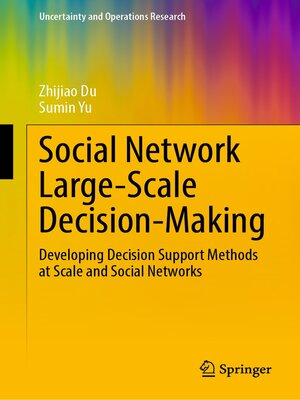Social Network Large-Scale Decision-Making
ebook ∣ Developing Decision Support Methods at Scale and Social Networks · Uncertainty and Operations Research
By Zhijiao Du

Sign up to save your library
With an OverDrive account, you can save your favorite libraries for at-a-glance information about availability. Find out more about OverDrive accounts.
Find this title in Libby, the library reading app by OverDrive.



Search for a digital library with this title
Title found at these libraries:
| Library Name | Distance |
|---|---|
| Loading... |
This book focuses on the following three key topics in social network large-scale decision-making: structure-heterogeneous information fusion, clustering analysis with multiple measurement attributes, and consensus building considering trust loss. To address the aggregation and distance measurement of structure-heterogeneous evaluation information, we propose a fusion method based on trust and behavior analysis. Then, two clustering algorithms are put forward, including trust Cop-K-means clustering algorithm and compatibility distance-oriented off-center clustering algorithm. The above clustering algorithms emphasize the similarity of opinions and social relationships as important measurement attributes of clustering. Finally, this book explores the impact of trust loss originating from social relationships on the CRP and develops two consensus-reaching models, namely the improved minimum-cost consensus model that takes into account voluntary trust loss and the punishment-driven consensus-reaching model. Some case studies, a large number of numerical experiments, and comparative analyses are provided in this book to demonstrate the characteristics and advantages of the proposed methods and models.
The authors encourage researchers, students, and enterprises engaged in social network analysis, group decision-making, multi-agent collaborative decision-making, and large-scale data processing to pay attention to the proposals presented in this book. After reading this book, the authors expect readers to have a deeper and more comprehensive understanding of social network large-scale decision-making. Inorder to make it more accurate for readers to understand the methods and models presented in this book, the authors strongly recommend that potential readers have a good research foundation in fuzzy soft computing, traditional clustering algorithms, basic mathematics knowledge, and other related preliminaries.







